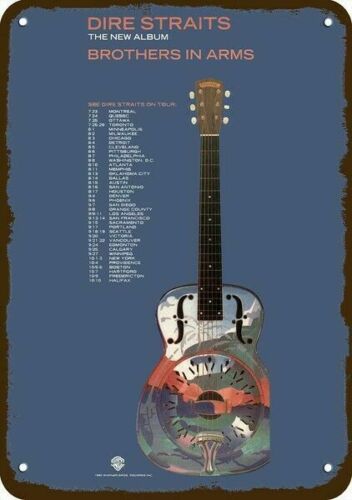-40%
1979 Mark Knopfler Dire Straits Guitar - 3-Page Vintage Article
$ 7.37
- Description
- Size Guide
Description
1979 Mark Knopfler Dire Straits Guitar - 3-Page Vintage ArticleOriginal, vintage magazine article.
Page Size: Approx. 8" x 11" (21 cm x 28 cm) each page
Condition: Good
RIDING CONFIDENTLY on the crest
of popular acclaim for their hit song
“Sultans Of Swing” the British rock
group Dire Straits has experienced almost
overnight success—a contemporary rags-to-
riches story whose title might read “From
Poverty To Platinum." Guided by lead gui-
tarist Mark Knopfler, the band has gone
from getting together and recording a demo
tape in the summer of 1977 to cutting what
has now become a certified platinum LP
(selling in excess of 1,000,000 discs). Dire
Straits [Warner Bros., BSK 3266], all in less
than two years. And a second album. Com-
munique (also on Warner Bros.), is sched-
uled to be released early in June of 1979
Exhibiting a diversity of playing styles
—including fingerpicking, clawhammering,
and frailing, on electric and acoustic guitars
—the 29-year-old Knopfler writes and per-
forms songs that showcase both his enthu-
siastic approach to the instrument and a
solid knowledge of folk, rock, and blues
idioms. Mark wrote all the songs on the
group's first album, and with the steady
backing of his brother David on rhythm
guitar, bassist John Illsley, and drummer
Pick Withers, Knopfler and Dire Straits
have forged their own distinctive sound by
combining some of the best aspects of tra-
ditional and contemporary musical styles.
As with so many other great British gui-
tarists, Mark became enchanted at a very
early age with the American black experi-
ence and its music—blues. He spent a great
deal of time in his youth listening to record-
ings of great blues guitarists like Blind Willie
McTell, Lonnie Johnson, Blind Blake, and
B.B. King. “I've got R&B in me.” he says,
“and I got into the Chicago bluesand B.B.
King when 1 was 16. 1 think I could call
Lonnie Johnson an influence, in some ways.
And the first time 1 heard B.B. King was on
the record Live At The Regal [ABC, 724],
That struck me as being a really terrific
thing, but I never sat down with a record
player and tried to play things note-for-
note. Instead, it was always more of absorb-
ing something of the spirit of the music.”
Knopfler got his first guitar, a red Hof-
ner V-2, when he was 15. Never having
taken music lessons, he relied on listening
to various guitarists on records and on the
radio to develop his chops. “Besides listen-
ing to the blues players,” he recalls, "I picked
up the basics from people like the Shadows,
the Everly Brothers. Duane Eddy, Rick
Nelson, and Elvis,” he says. While in high
school he played his Hofner in local bands.
“I played with different groups in and
around London.” he says, “and we did some
real diabolical stuff. 1 even played bass fora
while. Besides playing electric guitar. I'd
also get asked to play some acoustic stuff.
But, since 1 didn’t have an acoustic guitar at
the time. I used to borrow one from a friend
so I could play folk joints.
“I was into playing American music,
especially the blues. First. 1 learned how to
fingerpick—just the basic stuff—and then 1
jon sn:vrr i
MARK KNOPFLER
Innovative
began developing a clawhammer style. And
all during this time I was playing my solid-
body without an amp of my own. While 1
was into many different types of music, and
played with many different local groups. 1
really didn't have a band to call my own
until Dire Straits was formed in 1977."
After leaving high school, Mark pursued
a career in journalism. “1 went to work for a
newspaper in Leeds." he says, “and 1 worked
there for a couple of years. It was in Leeds
that I first got into National metal guitars. I
had a friend there who owned a few. and
after experimenting with his guitars. I got
my own: a 1928 triple resonator National
steel-body guitar. Since then, IVe acquired
a '30s vintage National Duolian. which is
the one you hear on the album.
“While in Leeds. 1 also got my first Gib-
son. It was one of their comparatively inex-
pensive models—a double cutaway from the
Leader Of
Dire Straits
By Joel A. Siegel
very late '50s. maybe a Les Paul Special or
a TV. Anyway, it was black, but 1 had it
restored to a cherry finish. 1 love Gibsons,
and Nationals, too. There's something
magical about them.”
After two years of working at the news-
paper. Knopfler left to pursue studies at the
State University of Leeds. "1 went there to
study English," he says, "and while there I
continued to carry on. getting a lot of play-
ing done. 1 wrote a couple of rags and
waltzes, but 1 never took an academic ap-
proach to composing. For me. it was always
just an ear thing; I'd listen to a song and
then just figure it out in my mind and play
it. While listening to things like western...
15521









